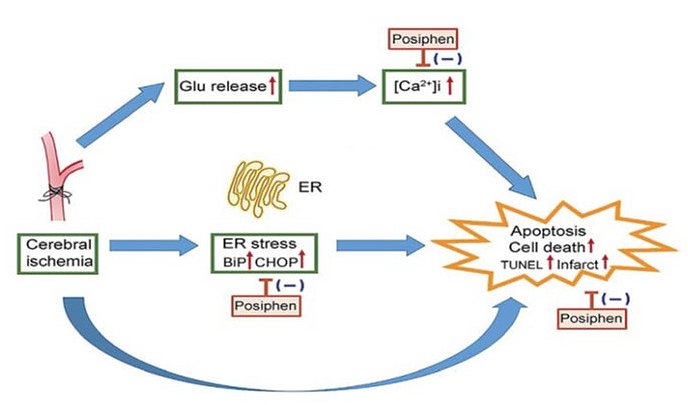
Stroke is a major brain disease worldwide being the second leading global cause of death (https://www.who.int/data/gho/data/themes/topics/causes-of-death/GHO/causes-of-death). Tissue plasminogen activator (tPA) is the only US FDA-approved pharmacological therapy for acute ischemic stroke. tPA dissolves occluding blood clots at a very early stage of stroke, but its effectiveness is limited by a narrow therapeutic time window of 3 hours. Less than 3 percent of stroke patients receive tPA, because they do not arrive at a hospital early enough for treatment. It is thus important to develop new therapies for stroke.
Increasing evidence supports that acetylcholinease (AChE) inhibitors have protective and anti-inflammatory actions against brain injury by increasing ACh in the synapses. However, the use of AChE inhibitors can lead to systemic cholinergic side effects. The efficacy of AChE inhibitor treatment depends on cholinergic integrity, which can be impaired in stroke brain. Posiphen is a stereoisomer of the acetylcholinesterase inhibitor Phenserine with no cholinergic receptor binding. In this study, Posiphen and Phenserine –induced protection was examined in celluar and animal models of stroke. A distinct protective mechanisms of Posiphen has been reported. Unlike Phenserine, Posiphen-mediated protection in neurons/microglia co-cultures were not antagonized by the nicotinic ɑ7 receptor antagonist methyllycaconitine. Posiphen selectively mitigated thapsigargin (Tg) -mediated neuronal death and release of the ER stress marker in cells over-expressing GLuc-SERCaMP as well as NMDA–mediated increase in Ca++i. Early post-ischemia treatment with Posiphen reduced IBA1 immunoreactivity, TUNEL activity, brain infarction size, and the expression of ER stress markers in the lesioned cortex in stroke rats. These data support novel neuroprotection mechanisms of Posiphen against stroke through regulating Ca++i and ER stress. Posiphen is currently under clinical trials in Alzheimer’s disease (https://clinicaltrials.gov/ct2/show/NCT02925650). It has been reported that people with Alzheimer disease have a higher risk of stroke. A high incidence of dementia was also found in the year after a major stroke. Posiphen may be a clinically useful therapeutic agent to prevent or treat comorbidity of stroke and dementia, while devoid of cholinergic side effects, in patients.
The study was conducted by Drs. Seong-Jin Yu and Yun Wang at the Center for Neuropsychiatric Research. (Please see full manuscript at iScience 23:2,100866, 2020).
Citation:
Yu, SJ; Wu, KJ; Bae, E; Wang, YS; Chiang, CW; Kuo, LW; Harvey, BK; Greig, NH; Wang, Y. Post-treatment with posiphen reduces endoplasmic reticulum stress and neurodegeneration in stroke brain. iScience. 2020 Feb 21;23(2):Article number 100866.
